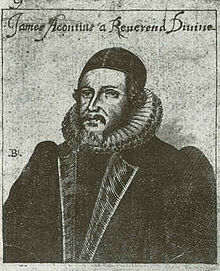Jacobus Acontius
Jacobus Acontius (also: Giacomo Aconcio , Iacopo Aconcio or Jacob Acontius ; born September 7, 1492 in Ossana ( Val di Sole ) or Trient , Italy ; † around 1567 in England ) was an Italian humanist , philosopher , theologian , lawyer and engineer . Like other Italians, for example Peter Martyr Vermigli or Bernardino Ochino , who rejected papal doctrine more sharply than Lutheran Protestantism , he found refuge in England.
Life
Acontius studied law and theology primarily and then became a notary in Trento. In 1556 he became secretary to Cardinal Cristoforo Madruzzo , the imperial governor in Milan .
As a supporter of the Reformation , he fled Italy in 1557. Via Basel , Zurich and Strasbourg he reached England in 1559, where he was happily welcomed by Queen Elisabeth I, who had only been enthroned for a short time , and found a job with the English government on February 27, 1560. He was busy draining the Plumstead Marshes, and in 1564 he was commissioned to draw up a report on Berwick fortifications.
Act
Acontius was a pioneer of rationalism , he exerted a great influence on unification efforts and the struggle for tolerance . He criticized the Bible , spiritualized the idea of the devil and posed the problem of truth.
Already with the work De methodo sive recta investigandarum tradendarumque artium ac scientiarum ratione libellus , published in Basel in 1558 and important for the history of logic , he met with violent rejection of all religious groups recognized at the time. From the evangelical foreign community, the Dutch Reformed Church in Austin Friars, which he had joined in England, he was expelled again by the London Bishop Grindl because of his “Anabaptist and Arian ” views .
Particularly notorious was the work that revealed the nature of his heterodoxy , Stratagematum Satanae libri VIII , often abbreviated as Stratagemata Satanae , published in 1565 and translated into several languages.
Acontius tried to find the common denominator of various creeds in order to preserve the essential contents of the Christian faith. To get to this common ground he had to remove dogma to a very low degree. On the basis of the distinction between fundamental articles of the Christian faith on the one hand and insignificant objects of theology of dispute on the other, Acontius advocated freedom from the obligation to confess and opposed the obligation to revoke and the use of the sword against heretics . He met with rejection and rejection again.
Other works, such as a doctrine of reason, remained unfinished or unprinted.
Works
- De methodo sive recta investigandarum tradendarumque artium ac scientiarum ratione libellus , first published in Basel 1558, later printed in the collective publication De studiis bene instituendis , Utrecht 1658.
- Stratagematum Satanae libri VIII , Basel 1565, (Ed.) Walther Köhler , Munich 1927.
literature
- Arthur Richter: Acontius, Jacob . In: Allgemeine Deutsche Biographie (ADB). Volume 1, Duncker & Humblot, Leipzig 1875, p. 40 f.
- Delio Cantimori : Aconcio, Iacopo. In: Alberto M. Ghisalberti (Ed.): Dizionario Biografico degli Italiani (DBI). Volume 1: Aaron – Albertucci. Istituto della Enciclopedia Italiana, Rome 1960.
- Erich Hassinger : Acontius, Jakobus . In: Theologische Realenzyklopädie (TRE). Volume 1, de Gruyter, Berlin / New York 1977, ISBN 3-11-006944-X , pp. 402-407.
- Friedrich Wilhelm Bautz : Acontius, Jacobus. In: Biographisch-Bibliographisches Kirchenlexikon (BBKL). Volume 1, Bautz, Hamm 1975. 2nd, unchanged edition Hamm 1990, ISBN 3-88309-013-1 , Sp. 20.
- Barbara Mahlmann-Bauer: Protestant religious refugees in Switzerland (1540–1580). In: Hartmut Laufhütte , Michael Titzmann (ed.): Heterodoxy in the early modern times (= early modern times. Vol. 117). De Gruyter, Berlin 2006, ISBN 978-3-1109-2869-3 , pp. 119-160.
- Manfred E. Welti: Brief history of the Italian Reformation (= writings of the Association for Reformation History . Vol. 193). Mohn, Gütersloh 1985, ISBN 3-579-01663-6 , pp. 111-135 ( digitized in the Google book search).
Individual evidence
- ^ A b Friedrich Wilhelm Bautz: Acontius, Jacobus. In: Biographisch-Bibliographisches Kirchenlexikon (BBKL). Volume 1, Bautz, Hamm 1975. 2nd, unchanged edition Hamm 1990, ISBN 3-88309-013-1 , Sp. 20.
- ↑ In the Encyclopædia Britannica of 1911 in the article Aconcio, Giacomo the 7th September 1492 is mentioned as a possible birthday , the BBKL does not specify it.
- ↑ after Encyclopædia Britannica (1911), article Aconcio, Giacomo
Web links
- Literature by and about Jacobus Acontius in the catalog of the German National Library
| personal data | |
|---|---|
| SURNAME | Acontius, Jacobus |
| ALTERNATIVE NAMES | Aconcio, Giacomo; Aconcio, Iacopo; Acontius, Jacob |
| BRIEF DESCRIPTION | Italian humanist and theologian |
| DATE OF BIRTH | September 7, 1492 |
| PLACE OF BIRTH | Ossana or Trento , Italy |
| DATE OF DEATH | around 1567 |
| Place of death | England |
